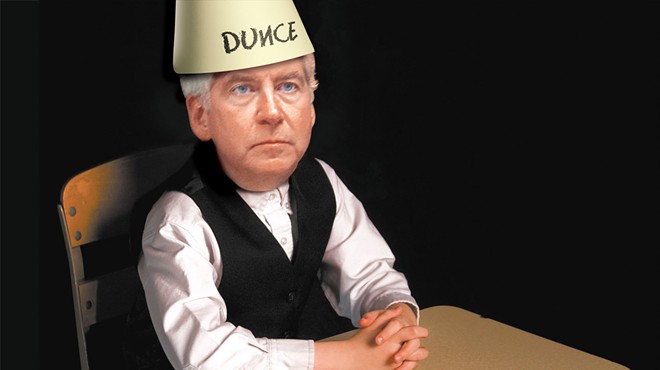I was talking to Wayne County Sheriff Benny Napoleon the other day about Detroit. Napoleon is a cheerful, smart, and decent man who was the last opponent left standing when Mike Duggan was elected mayor four years ago.
Napoleon is anything but bitter. "I never at any point thought that Mike would be a bad mayor. I just thought I would be a better mayor," he said with a laugh.
Actually, he thinks Duggan has done a mostly fine job — and is supporting him for re-election. "He has taken on one of the toughest jobs in America," he said. "I don't think people realize how tough the problems are."
Napoleon, who is also a former Detroit police chief, does think Duggan should talk and do more about crime — namely, add more police officers. Response rates are faster, but he said that means officers are stretched so thin they really don't have a chance to do much preventive policing.
Frankly, he thinks he needs the county to give him more sheriff's deputies as well, and provide better pay and benefit packages so he can be competitive in recruiting the very best.
But I then asked him about the big elephant in the room, the one problem somehow no one talks much about: Detroit's enormous underclass.
That's not a pretty term, but offhand, it's hard to think of one better. We're talking about adults with little education and fewer job or even life skills.
These are people who may or may not be literate. Many are not in the labor force at all. They have little or no history of work; of life skills, like getting somewhere on time every day; of earning money in a taxes-deducted-from-your-check way.
Others may have just given up in despair, defeated by the economy and difficult lives, as documented by University of Michigan poverty researcher Luke Shaefer in his stirring book: $2.00 a Day: Living on Almost Nothing in America."
Napoleon didn't have an answer — though he agreed with my theory that something like the old Great Depression-era WPA could be used to put at least some of these folks to work.
Certainly they could be cleaning up parks and sites where buildings have been demolished, and doing other things; plus maybe learning work and lifestyle skills. But again, we don't seem to be talking much about these folks.
Maybe that's because we've been brainwashed to believe that government-created jobs are "socialism" and worthless — unless, of course, they are jobs created to potentially kill people.
Then they are the honored Armed Forces of the United States. There's also a belief among even some liberals that we tried to help the underclass and lift them up during Lyndon Johnson's War on Poverty, and that those efforts totally failed.
But I think we don't make aggressive efforts to reach and help the deep underclass because we don't have a clue how to do it, and doing so would seem too costly and too hard.
But here's a message for Mayor Mike Duggan, assuming he defeats the hapless and underfunded Coleman Young II in November: You have to try to solve this problem.
Otherwise, Detroit's efforts to bring itself back to anything like a normal, vibrant, financially secure city are doomed.
What's amazing to me is, again, how virtually all futuristic visions for Detroit utterly ignore these people. Years ago, a correspondent for Time magazine blandly told me he thought if we just stopped giving them welfare, they'd go away.
Well, they aren't going away, nor should they. Detroit may be the most studied urban area in modern times. Nevertheless, when you consider the underclass, it isn't easy to get anything like a precise estimate of how many folks that is.
Detroit Future City, a well-regarded nonprofit corporation that grew out of the city economic development department, published an excellent report last month: 139 Square Miles with a lot of useful information.
Demographers now tend to fix Detroit's current population at 672,000. According to Detroit Future City, about 53 percent of those folks, or 356,000, live in "areas of concentrated poverty" — census tracts where at least 40 percent of the population is living below the poverty line.
In fact, slightly more than 40 percent of all Detroiters are below the federal poverty line, which is defined as no more than $24,339 a year for a family of four. Try living on that sometime.
Many, in fact, have much less. That might be a good rough estimate of the number of Detroiters not easily employable.
Many of them aren't employed at all, of course. Using census data, Detroit Future City came up with another statistic highlighted by Metro Times' Violet Ikonomova a couple weeks ago: In Detroit, where 80 percent of the population is black, African-Americans hold only 33 percent of all jobs.
Stunning? Amazing? Horrifying? Yes, all of that. What's more, this is a smaller percentage than it was in the depths of the Great Recession, when 36 percent of Detroit jobs were held by black people. (That doesn't mean nobody else in the city is employed. Detroit Future City also found that some of the lowest paid Detroiters, those earning barely $15,000 a year, had hour-long commutes.)
Detroit has many other problems, some of which Mayor Duggan and other urban experts will more willingly talk about.
For example, Detroit has to find a way to assemble parcels of land large enough to attract new modern plants and factories. Detroit has to find a way to build an affordable system of public schools that work and which parents can be comfortable with.
All of that is important.
But the city also contains a large number who have fallen off the edge of society and the conventional economy.
We not only ignore that at our peril. Ignoring them would be a surefire way to ensure Detroit's eventual doom.
Why is anyone surprised?
There was a lot of hand-wringing at the news that Robert Ritchie, the sometimes-Confederate flag-waving singer known as Kid Rock, was selected to be the opening act at the now Little Caesars Arena.
"It's a message that's not too far off those Jim Crow-era signs warning that blacks were not welcome," Detroit Free Press editorial page editor Stephen Henderson moaned.
Well, yes. The Ilitches could have been diplomatic and gotten somebody else. But the fact is, they didn't have to. For decades, Detroit has sent them the message that they could pretty much do whatever they wanted, and the poor taxpayers would be dunned to help pay for the billionaires' pleasure.
For example, Crain's Detroit Business estimates the total public cost of the new arena at $324.1 million. Did the City of Detroit get a slice of the concession stand or parking revenues, as they did with other stadiums? Well, no.
They only got to help pay for it. We know that few black people buy tickets to baseball or hockey games. Basketball is a little different, but it's the whites from the suburbs who have the money for the corporate suites and big-ticket concerts.
The family is all about making money. They might have at least pretended to have a social conscience if their hosts even required it of them. But Detroit never has.
Congratulations, Mr. Ilitch, wherever you are.






